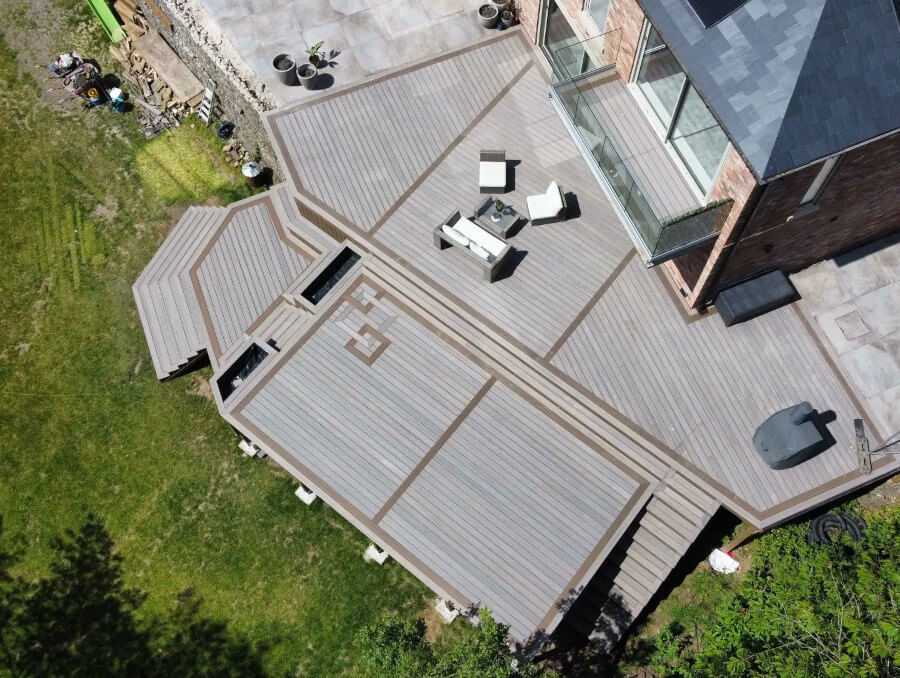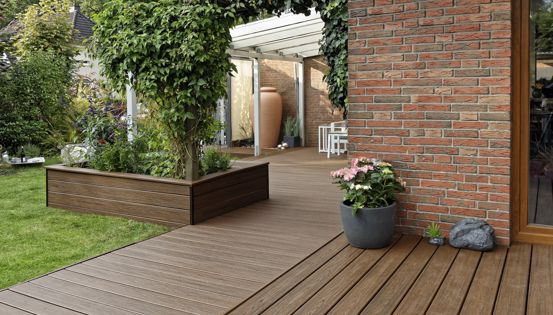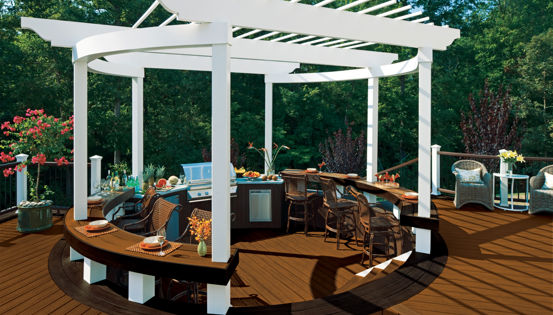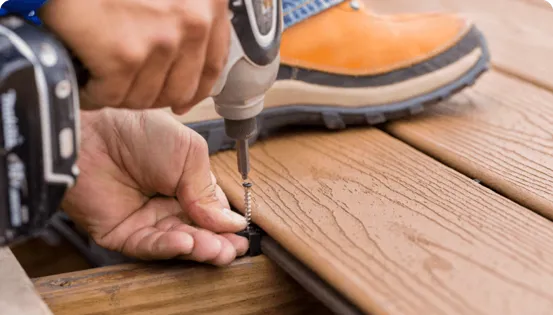Looking to change up your outdoor space and expand your deck? It might be time to consider building a deck extension. A deck expansion offers an opportunity to create a larger outdoor space where you can add dedicated areas for all types of activities in your outdoor space.
There are a few ways to extend and remodel a deck, but aiming for a low-maintenance, timeless design is a good idea if you want to avoid more construction in the future.
Ways to Extend a Deck
Before extending your deck, you should know what kind of extension you want. There are three main options:
Same-level deck extension
A same level means extending the deck at the same height as your current deck. You can widen your deck, lengthen it, or both.
Step-down extension
A step-down extension means adding a downward step or lower secondary level. To achieve this, you'll need enough space below your existing deck to install the joists, support beams, and boards. You can often attach new joists to the bottom of your existing support beams, though only if the support beams are correctly sized. Check with your local municipality for local building codes regarding sizing.
Step-up extension
A step-up extension adds an upward step or higher secondary level to your deck. You need a solid existing substructure for a step-up extension, as you'll build your new substructure frame on top of the old substructure.
Considerations Before Adding Onto a Deck
When adding onto a deck, you need to think about the stability of your existing substructure, the design you want for your new deck, the price and lifespan of your materials, and matching new deck boards to old ones.
There are some similarities to building a new deck to extending one, but there are a number of things you’ll need to take into consideration. For example, consider how much longer the deck will last — with older or poorly maintained decks, you may need to weigh up an extension vs. a more significant rebuild.
Building Codes & Permits
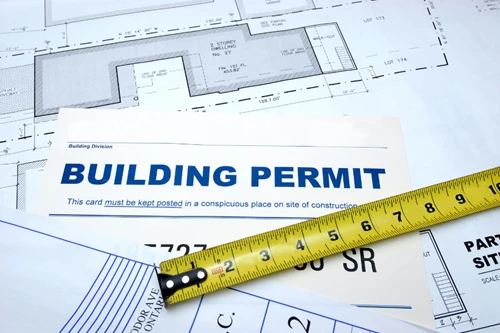
Before building a deck extension, you should talk to your local building department, as additional construction may not be allowed in some municipalities. Whatever the local building codes are, you’ll increase your chances of being allowed to build if you have a detailed plan. Check out some of our deck plans, where you can download plans, material lists, and more.
You may want to bring a few pictures of the existing deck along, too, to help explain your situation. The inspector will usually want to review the permit and inspection records for the existing deck and may call for an as-built framing inspection to verify the deck's condition before issuing a permit.
Existing Deck Substructure
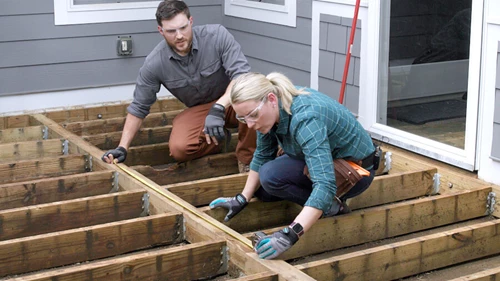
Most decks are not built with a future addition or extension in mind. Because of this, your footings may not be large enough to support the new loads created by the addition. In these cases, you must frame the new deck addition independently of the existing frame. This means installing new beams and footings to support the addition.
Deck Joists & Beams
Some deck builders choose to sister the new joists back over the existing beam and install a new beam in front of the existing deck. The sistered joists are nailed into the sides of the existing joists and extend past the beam at least 6". Hurricane ties are used to create a positive joist-to-beam connection.
It may be necessary to install new posts and footings below the existing deck beam to support the additional loads. Most people that add to their decks also replace the decking and railings on the existing deck simultaneously. This will create a more seamless addition without noticeable color and weathering differences in materials.
DIYing a Deck Extension vs. Hiring a Contractor

Before you decide on a DIY deck extension vs. hiring a contractor, you should have a plan for your deck extension. This means checking the condition of your substructure to make sure it can support deck expansion and deciding on a design plan for the new deck area.
Issues to look for with your substructure include:
- Moisture damage
- Rusted fasteners
- Fasteners that have come loose
- Wood rot
- The ledger board separating from the structure
- Insect damage
If your substructure looks good, you can decide whether or not the job is something you can handle yourself. If you decide a DIY approach isn’t an option or simply want help to extend your deck, you should hire a contractor.
Matching Existing Deck Boards
Matching new deck boards with existing deck boards can be difficult. Age changes wood in particular, but composite boards also become lighter over time.
You can sand and refinish the existing boards with a wooden deck to achieve a reasonably even look. For composite decking, you might need to resurface your entire deck to ensure a good match between deck boards.
Resurfacing the Entire Deck vs. Adding Onto an Existing Deck
Resurfacing your whole deck rather than just the new area is usually the best option when building an extension. There are a few pros to adding new boards to the entire structure. Firstly, resurfacing doesn’t only create a uniform look, it also means your deck boards will all have roughly the same lifespan. Plus, it allows you to inspect the substructure properly.
If your existing decking is only a few years old, adding new boards and waiting for them to weather is also an option. Composite decking doesn’t change too much visually over time, so with similar weather conditions, it should be a reasonable match within a few months, assuming you can get the exact same style and color of boards for the extension used in the original deck.
Tools & Materials Needed for Extending a Deck
The materials and tools you will need to extend an existing deck are very similar to the materials and tools you need to build a new deck:
- Tape measure
- Circular and miter saw
- Drill, Driver, and assorted bits
- Speed square
- Rubber mallet
- Personal safety equipment
- Levels and clamps
- Wrenches, sockets, and ratchets
- Treated lumber for your new substructure
- Joist tape for tops of joists
- Decking that matches or complements existing boards
- Paint or stain to refinish existing wooden boards to match new ones
- Handrail system components
- Hidden fasteners
- Trex Universal Hidden Fastener Tool
- Any accessories you use, like LED accent lighting, post caps, post bases trims, etc.
Layout the Perimeter
To determine where to place the support posts and footings along the frame of your deck extension, measure out the perimeter of the new addition to check your measurements are correct and give you a border to work towards. While these steps are similar to the steps you’d take to build a new deck, there are several differences between them. Consider how you will attach the new frame to the existing one. You have to keep in mind the placement of the new area of the deck concerning any existing structures that will support them, for example, as well as how new deck boards will be placed relative to older boards.
Step 1: Start by Staking
This means hammering wooden stakes into the corners of the proposed extension to indicate the deck’s new outline.
Step 2: Create a String Outline
Tie mason twine from the screws to the posts and between the posts. Adjust the string’s height to match the height of the top of the deck's original edge joist.
Step 3: Mark Post Locations
The distance needed for your post holes depends on the size of your beams, which in turn depends on what your local municipality mandates. Check with your local municipality before you plan your deck. When deciding on post locations, use a tape measure, mark the locations along your string, and wrap a piece of tape around where a post will be. These spots are where you’ll dig your post holes.
Building the Deck Frame
Building the frame for a deck expansion can be complex. The exact placement of new joists and support beams depends on the sort of extension you’re building.
Decks.com has a number of resources on generally how to frame a deck. If using a step-up or step-down extension, learning how to frame a multi-level deck is a good place to start.
Installing Deck Boards
At this point, you should have decided whether you’re refinishing your entire deck surface or just adding onto an existing deck with new boards that match as closely as possible. If you need step-by-step instructions, you’ll find them in this article on how to install deck boards.
Learn More About How to Extend an Existing Deck
Want to know more about designing a deck extension and extending your deck successfully? Start by looking at these articles on Decks.com:
